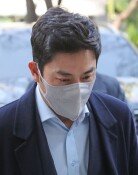[Editorial] Warring Factions Within the Ruling Party
[Editorial] Warring Factions Within the Ruling Party
Posted January. 13, 2010 08:32,
Will the governments revision of the Sejong City development plan be passed at the National Assembly? It depends on whether the pro-Lee Myung-bak and the pro-Park Geun-hye factions within the ruling Grand National Party will cooperate or fight each other. To implement the revisions, the Special Act for the Construction of the Administrative-centered Comprehensive City and the Special Tax Treatment Control Act need amendment. To this end, more than 150 of 298 lawmakers must vote for the revision. The ruling party controls 169 seats (57 percent) in parliament, but if 52 pro-Park lawmakers oppose, the plan cannot pass.
On if former party leader Park Geun-hye might change her stance even if public opinion in the Chungcheong provinces leans toward supporting the revised plan, Park firmly said no. If the party fails to persuade her camp, the revised plan will remain just a plan.
At this point, the two factions must hold intensive talks to set the partys stance. They should also be willing to accept the political consequences of their actions. If they keep hiding their political intentions and emphasizing good cause, they cannot end the confusion. The people are too tired to ask the president and Park to cooperate in national administration. The persistent conflict between the two factions prompts observers to question why they are bound as a political party.
It is worrisome that the two factions are under pressure to hold a meeting and pretend to reach an agreement. Certainly, they need to discuss what their real intentions are in public and what principles they have, what is good for Koreas future, what their arguments are, and why the other faction is wrong. After a series of intense discussions, their arguments should be evaluated by the public.
Is it a principle and a way to satisfy the publics confidence to unconditionally relocate government organizations on the grounds that the plan was passed at parliament and promised by a candidate in the 2007 presidential election, even if it will bisect the capital and undermine efficiency? Is it right for Koreas future to change a promise on the grounds that it resulted from irresponsible populism espoused by politicians to attract votes from Chungcheong residents? Is it possible to stick to the revised plan without making additional changes? Is it right to argue that the revised plan will not cause corporations and financial resources that other regions need to be channeled into Sejong City? The two factions should have intense discussions to reach an agreement on how to strengthen national competitiveness, contribute to public welfare, deal with overpopulation in the Seoul metropolitan area, and reinforce balanced growth in the country.







